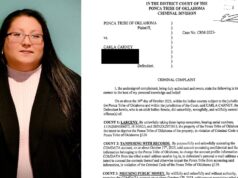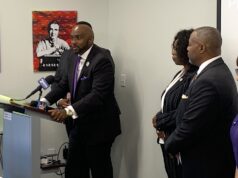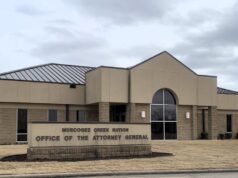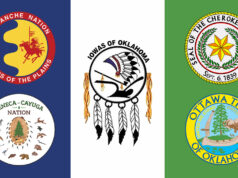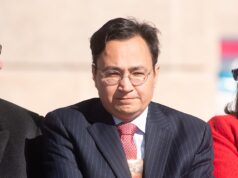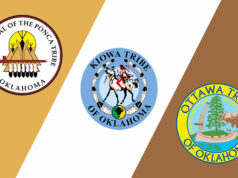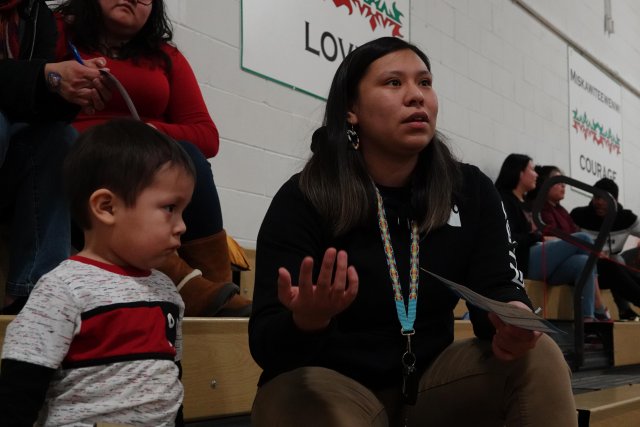
TAMA, Iowa — In a basketball gym on a frigid Iowa evening, members of the Meskwaki Nation filed into bleachers, taking their seats under handwritten signs that displayed the names of Democratic candidates vying for the presidency.
As 71 attendees arrived to participate in the Iowa caucus, members of the Meskwaki community, the Sac and Fox Tribe of the Mississippi in Iowa and the only federally recognized tribe in the state, became the first Native American tribe in the country to have a voice in the 2020 election.
This story was reported by Gaylord News, a Washington reporting project of the Gaylord College of Journalism and Mass Communication at the University of Oklahoma.
Among the caucusers was Sylvia Brown, a member of the Sac and Fox Nation from Stroud, Oklahoma, who moved to the Meskwaki settlement eight years ago. Since moving to the community, Brown said she is known as a “troublemaker,” who does not shy from voicing her opinions.
As she took the stage on Monday night, Brown embraced her reputation by giving a passionate speech to the caucusers.
“You’re the only Native Americans in the United States right now that are having your own caucus, and you guys are the only ones that have a voice for all of Native Americans across the United States,” Brown said to her fellow caucusers. “This is so important.”
Brown spent the evening caucusing for Sen. Bernie Sanders (D-VT), alongside over half of the caucus attendees. But across the gym, nine people remained undecided on which candidate to support.
“Right now, you’re not counting for anything. But if you go [for Sanders], you are going to count for something,” said Teresa Brewington, urging an undecided caucuser to support Sanders.
Brewington’s strategy worked, as undecided attendees began filing to the sign reading “Sanders,” although a few aligned with Sen. Elizabeth Warren (D-MA) and Andrew Yang supporters.
At the end of the night, Sanders was awarded 5 delegates, winning the support of 43 caucusers. Warren and Yang were each awarded 2 delegates as part of the convoluted process in Iowa in which the caucuses exist to select the delegates that will attend the county convention in March. There, delegates go to the state convention and are selected based upon votes cast in the precinct’s caucuses.
While deciding which candidate to align with, members of the Meskwaki community said their top-policy focus was climate change.
“Our house is already burning,” said tribal historian Johnathan Buffalo regarding the fires in California and Australia. “It just hasn’t come to our house.”
Members of the Meskwaki Nation have been voting since 1924. But Buffalo said many tribes are still fighting to overcome barriers to voting, such as trouble with states recognizing tribal IDs or requiring voters to provide a street address — something some reservations do not have.
“We feel we are Iowans. We are caucusing as Iowans,” Buffalo said. “Unfortunately, some tribes today are still fighting for that.”
Standing on the stage, Brown said the Meskwaki caucus, a relaxed event where attendees spent the evening laughing together in the middle of the gym, was a vital moment for the country.
“The California Indians are listening to this right now. My sister in Washington state is listening to this right now. My friends out in Washington, D.C., are listening to this right now,” Brown said. “This is the turning moment across the United States for all of us.”
Little did they know, their votes were not being reported as Iowa Democrats struggled to collect the results from across the Hawkeye State. Preliminary results were not expected until later Tuesday afternoon.











